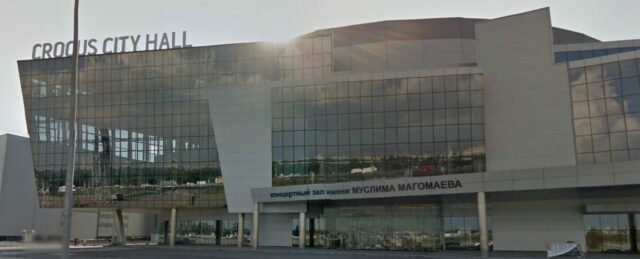
Geopolitical Report ISSN 2785-2598 Volume 40 Issue 9
SpecialEurasia OSINT Team
The terrorist attack at Crocus City Hall in Moscow serves as a stark reminder of the persistent threat of terrorism within Russia and the Eurasian geopolitical chessboard. The indiscriminate violence unleashed by unknown assailants resulted in 40 fatalities and over 100 injuries, highlighting the vulnerability of civilian gatherings and cultural institutions to extremist acts.
Despite the determined efforts of Russian authorities to strengthen security measures and respond promptly to emergencies, this incident highlights the persistent challenges posed by terrorist groups active within the country’s borders.
Background Information
On March 22nd, 2024, a commando composed by four armed men opened fire against people at the Crocus City Hall in Krasnogorsk, Moscow. Unknown assailants started gunfire, resulting in 40 casualties and over 100 injuries. The attack targeted attendees of a concert by the Picnic group. Subsequently, an explosion and fire engulfed approximately a third of the building.
In response to the crisis, Russian authorities quickly enacted emergency protocols, which involved the deployment of law enforcement, firefighters, and medical teams.
Crocus City Hall, situated within the Crocus business centre near Myakinino station, serves as a prominent concert venue in Krasnogorsk. Owned by the Crocus Group, the facility boasts a seating capacity of over 9.5 thousand and spans over 38 thousand square meters. Opened in 2009, it stands as a symbol of cultural and entertainment significance in the region.
The Investigative Committee of the Russian Federation started a criminal investigation, categorising the incident as a terrorist attack. Governor Andrei Vorobyov announced the establishment of an operational headquarters to coordinate response efforts, while the Ministry of Health took personal control of victim help. The authorities promptly reinforced security measures at key transportation hubs and cancelled all public events in Moscow and the surrounding region.
Scenario Analysis
- The investigation into the terrorist attack at Crocus City Hall in Moscow remains ongoing, with no definitive information or sources yet identifying the perpetrators behind the heinous act. Notably, a few weeks ago, the US embassy and other Western countries raised concerns about potential violent incidents in the lead-up to the Russian presidential elections, underscoring the heightened security environment within the Russian Federation. Russian security authorities criticised Washington’s words and accused the United States to be behind militants and the attempts to destabilise the Russian territory.
- Prior to the elections in early March, Russian security forces made significant strides in thwarting terrorist threats. Russian authorities arrested a terrorist cell planning an attack on a synagogue in Moscow. Concurrently, the Russian Federal Security Service (FSB) successfully neutralised a terrorist cell affiliated with the Islamic State in Ingushetia.
- The recent escalation of missile and drone attacks by Russian armed forces in the ongoing conflict in Ukraine has raised speculation about potential connections to the terrorist attack in Moscow. However, as of now, no concrete evidence or sources have emerged to confirm any linkages between the incident and Kremlin’s actions in Ukraine. The possibility remains under scrutiny as part of ongoing investigations.
- Analysis of footage shared on various social media platforms suggests that the perpetrators meticulously planned the attack with the primary aim of inflicting maximum casualties. The coordinated nature of the assault shows a strategic intent to cause widespread harm and instil fear among the populace, as happened in the past in other terrorist attacks in Europe, i.e. the Bataclan.
- Regarding the Russian security, although violent attacks have reduced in the region, the North Caucasus is still a fertile ground for jihadist propaganda. In addition, in this scenario, we might consider also the activities of the North Caucasian volunteer battalions that are fighting in Ukraine against the Russian armed forces.
Read also | Counter-Terrorism Operation in Ingushetia: A Risk Assessment |
Conclusion
The terrorist attack at Crocus City Hall underlined Russia is not immune from the terrorist threat the challenges it poses to national security. Despite the swift response of Russian authorities, the ongoing investigation has yet to identify the perpetrators definitively, leaving crucial questions unanswered. Speculation regarding potential connections to Russia’s actions in Ukraine remains under scrutiny.
The attack’s coordinated nature underscores the need for heightened vigilance and enhanced security measures. Among the terrorist groups that represent a threat to the Russian Federation, we can mention the Islamic State, Hayat Tahrir a-Sham, and Imarat Kavkaz (Caucasus Emirate), although the last one has not been fully operative in the last years.
*Last Update: March 22nd, 2024 – 09.00 pm CET
Islamic State Claims Responsibility for the Terrorist Attack

On March 22nd, 2024, at around 10.15 pm CET, social media accounts and forums on the Dark Web reported the news that a security source told Amaq Agency:
“Islamic State fighters attacked a large gathering of Christians in the city of Krasnogorsk on the outskirts of the Russian capital, Moscow, killing and wounding hundreds and causing great destruction to the place before they withdrew to their bases safely.”
If the information will be confirmed, the terrorist attack might underline the rising threat of the Islamic State in Russia. In addition, it might highlight the impact of jihadist propaganda on the Russian Muslim community and the migrants, especially those coming from Central Asia.
*Last Update: March 22nd, 2024 – 10.30 pm
For those with an interest in acquiring comprehensive insights into the terrorist threat in the Russian Federation, we encourage you to reach out to SpecialEurasia by emailing info@specialeurasia.com. We are ready to assist you in evaluating the possibility of acquiring a carefully crafted and customised report to meet your intelligence requirements.



